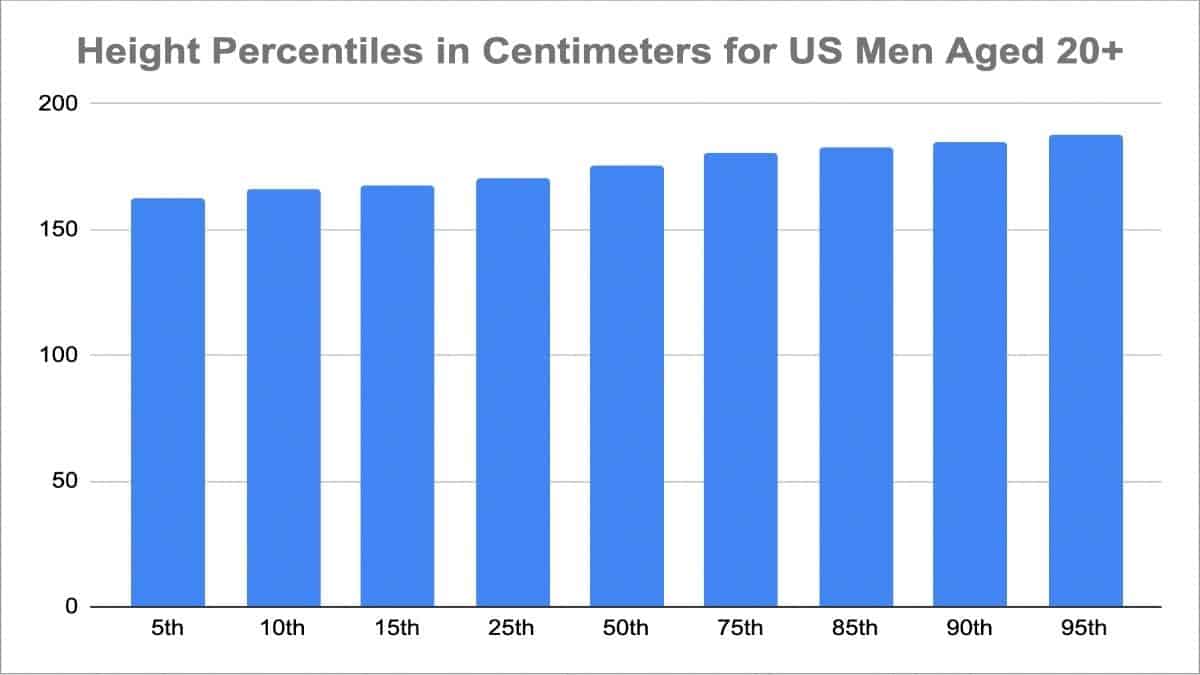Average Male Height In U.S: Unveiling The Stats, Myths, And More
Hey there, folks! Let’s dive into something that’s been a topic of conversation for ages—average male height in the U.S. Whether you're scrolling through social media or chatting with friends, this topic seems to pop up everywhere. Height, especially when it comes to men, carries a lot of cultural weight. But what exactly is the average height for males in the U.S., and why does it matter? Stick around, because we're about to break it all down for you in a way that’s super easy to digest.
You might be surprised to learn that the average male height in the U.S. isn’t just a random number pulled out of thin air. It’s actually based on decades of research and data collection by some of the most credible organizations out there. Think about it—height affects everything from fashion trends to workplace ergonomics. So yeah, understanding the average male height in the U.S. is kind of a big deal. Let’s dig deeper, shall we?
Now, before we get into the nitty-gritty details, let me ask you a question—do you think you’re taller or shorter than the average guy in America? Most people have no clue until they actually see the stats. That’s where we come in. We’ve got all the juicy details, plus a few fun facts that will make you go, “Whoa, I didn’t know that!” So grab a cup of coffee, settle in, and let’s talk about the average male height in the U.S.
Why Does Average Male Height in U.S. Matter?
Height matters more than you think. In today’s world, physical attributes like height often influence how people perceive others. Whether it’s in the dating scene or the workplace, height plays a subtle but significant role. For instance, studies show that taller men tend to earn more money and are perceived as more authoritative. But here’s the kicker—not everyone fits into the “average” category, and that’s perfectly okay!
Let’s break it down further. The average male height in the U.S. is a benchmark that helps researchers understand population trends, health disparities, and even genetic factors. It’s not just about vanity; it’s about understanding the broader picture of human development. Plus, knowing the average male height in the U.S. can help industries design products that cater to the majority, from clothing sizes to furniture dimensions.
So, what exactly is the average male height in the U.S.? According to the Centers for Disease Control and Prevention (CDC), the average height for adult males in the U.S. is approximately 5 feet 9 inches (175.3 cm). This number has remained relatively stable over the past few decades, but there are some interesting variations based on ethnicity, geography, and socioeconomic factors. Stick with us as we explore these nuances in more detail.
- Trilece Das Ultimative Rezept Geheimnisse Entdecken
- Sophie Rain Enthllung Der Heiesten Videos Und Nacktbilder
The Science Behind Male Height
Okay, let’s talk science for a sec. What determines a guy’s height, anyway? It’s a mix of genetics, nutrition, and environment. Your DNA plays a huge role, but factors like diet, exercise, and overall health also contribute to how tall you’ll grow. For example, kids who grow up in households with access to proper nutrition and healthcare are more likely to reach their full height potential.
Here’s a fun fact: Height is determined by the length of your bones, particularly your femur, spine, and skull. These bones grow rapidly during adolescence, which is why puberty is such a critical period for height development. But once you hit your early twenties, that growth pretty much stops. So if you’re still hoping to grow taller after 25, sorry to burst your bubble, but it’s unlikely.
Now, let’s talk about some common myths. A lot of people believe that drinking milk or doing certain exercises can magically increase your height. While calcium-rich foods and physical activity are great for overall health, they won’t add inches to your stature once your growth plates close. Science is science, folks!
Factors That Influence Male Height
Let’s break down the key factors that influence male height:
- Genetics: Your parents’ height is a strong predictor of your own. If both your parents are tall, chances are you’ll be tall too.
- Nutrition: A balanced diet rich in protein, vitamins, and minerals supports healthy bone growth during childhood and adolescence.
- Health: Chronic illnesses or hormonal imbalances can stunt growth if left untreated.
- Environment: Growing up in a supportive environment with access to education and healthcare can positively impact height development.
It’s important to note that not everyone will reach the “average” height, and that’s totally fine. Height is just one aspect of who you are, and it doesn’t define your worth. Keep reading to learn more about how height varies across different demographics.
Breaking Down the Numbers: Average Male Height in U.S. by Ethnicity
Did you know that average male height in the U.S. varies slightly depending on ethnicity? According to data from the National Health and Nutrition Examination Survey (NHANES), here’s how it breaks down:
- White males: Average height is around 5 feet 9.5 inches.
- Black males: Average height is approximately 5 feet 9 inches.
- Hispanic males: Average height is roughly 5 feet 7 inches.
- Asian males: Average height is about 5 feet 7.5 inches.
These differences are largely due to genetic and environmental factors. For example, Asian populations tend to have shorter average heights due to genetic predispositions, while African American and Caucasian populations often have taller averages. However, it’s worth noting that these numbers are averages, and individual heights can vary widely.
Geographic Variations in Male Height
Where you live can also impact your height. Studies show that people living in urban areas tend to be slightly taller than those in rural areas. Why? Access to better healthcare, education, and nutrition in cities may contribute to this trend. But don’t worry, country folk—there are plenty of other advantages to living outside the hustle and bustle of the city!
Another interesting factor is international comparisons. While the U.S. ranks relatively high in terms of average male height, countries like the Netherlands and Denmark consistently top the list. Dutch men, for example, have an average height of over 6 feet. What gives? A combination of excellent healthcare systems, high standards of living, and genetic factors seems to be the recipe for success.
Historical Trends in Male Height
Believe it or not, average male height in the U.S. hasn’t always been the same. Back in the 1800s, the average American male was about 5 feet 7 inches tall. Over the years, improvements in nutrition, healthcare, and living conditions have contributed to a gradual increase in height. However, this trend seems to have leveled off in recent decades.
Historians attribute this stagnation to factors like obesity, sedentary lifestyles, and socioeconomic disparities. While we’re taller than our ancestors, we’re not necessarily healthier. In fact, the U.S. ranks relatively low in life expectancy compared to other developed nations. This highlights the importance of addressing underlying health issues to ensure that future generations can reach their full potential.
Global Perspectives on Male Height
When it comes to global height comparisons, the U.S. falls somewhere in the middle of the pack. Countries in Northern Europe consistently rank at the top, while nations in Southeast Asia and Africa tend to have shorter averages. Interestingly, some African populations, like the Dinka tribe in South Sudan, have surprisingly tall averages due to genetic factors.
But here’s the thing—height isn’t everything. While it’s fun to compare numbers, it’s important to focus on overall health and well-being. After all, a tall guy with poor health isn’t necessarily better off than a shorter guy who’s in great shape. Balance is key!
Psychological Impact of Height
Let’s shift gears and talk about the psychological side of things. Height can have a significant impact on self-esteem and social interactions. Taller men often report feeling more confident and assertive, while shorter men may struggle with feelings of inadequacy. But here’s the good news—confidence isn’t determined by your height; it’s determined by how you carry yourself.
Research shows that body language, posture, and communication skills can make a bigger difference than physical height. So if you’re on the shorter side, don’t sweat it! Work on building your confidence through positive self-talk, goal-setting, and surrounding yourself with supportive people. Trust me, it works wonders.
Height and Career Success
There’s a common belief that taller men have an advantage in the workplace. While there’s some truth to this, it’s not the whole story. Studies suggest that taller men may be perceived as more authoritative and competent, but skills, experience, and personality ultimately matter more than height. In fact, some of the most successful leaders in history were shorter than average, including Napoleon Bonaparte and Mahatma Gandhi.
So, if you’re worried about your height affecting your career, don’t be. Focus on developing your skills, networking, and building a strong professional reputation. These factors will take you much further than your height ever could.
Frequently Asked Questions About Male Height
Let’s address some of the most common questions people have about average male height in the U.S.:
- Can I increase my height after 25? Not likely, but staying active and maintaining good posture can make you appear taller.
- Does height affect dating success? It can, but personality and compatibility matter much more than physical attributes.
- Are taller men healthier? Not necessarily. Height is just one factor among many that contribute to overall health.
These questions highlight the curiosity and concern people have about their height. Remember, everyone is unique, and there’s no one-size-fits-all answer to these questions. Embrace who you are and focus on the things you can control.
Conclusion: Embrace Your Height, Whatever It May Be
Alright, folks, that’s a wrap on our deep dive into average male height in the U.S. We’ve covered everything from the science behind height to the psychological impact it can have on individuals. Whether you’re tall, short, or somewhere in between, remember that your worth isn’t defined by your height. Confidence, kindness, and hard work will take you much further in life than a few extra inches ever could.
Before you go, we’d love to hear your thoughts! Do you think height matters as much as people say it does? Share your experiences in the comments below, and don’t forget to check out our other articles for more insights on health, wellness, and lifestyle. Thanks for reading, and stay awesome!
Table of Contents
- Average Male Height in U.S: Unveiling the Stats, Myths, and More
- Why Does Average Male Height in U.S. Matter?
- The Science Behind Male Height
- Factors That Influence Male Height
- Breaking Down the Numbers: Average Male Height in U.S. by Ethnicity
- Geographic Variations in Male Height
- Historical Trends in Male Height
- Global Perspectives on Male Height
- Psychological Impact of Height
- Height and Career Success
- Frequently Asked Questions About Male Height
- Travemnde Karte Sehenswrdigkeiten Urlaubstipps Entdecken
- Bo6 Loadouts Ultimative Waffenbuilds Aufstze

Average Male Height for Men in the US and the World

Average Male Height for Men in the US and the World

Average Male Height for Men in the US and the World